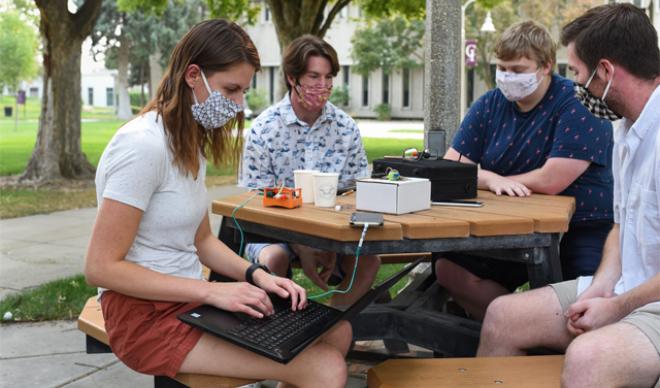
In her first year on campus, a unique opportunity presented itself to Dr. Rachel Miller, courtesy of the COVID-19 pandemic.
“We study them (historical events and periods), we look at them in the rearview mirror,” said Miller, an assistant professor of history. “But rarely do we have room in a history class to process what it’s like to live through all that.”
That opportunity manifested itself through “Civ,” a history class (either History 110, 111, or 112) that is required for all new students at the College. As a part of the class this past fall, each student was required to conduct four interviews with different people and write an essay as part of an oral history of COVID-19. The interviews and essays were compiled and will be kept for future students and researchers to study when they want to learn more about how the pandemic impacted the extended College community.
“We gave the students a list of possible questions (for the interviews) but one of the guiding principles of an oral history is that you allow the person to tell you in their own words and their own structure,” Miller said. “The goal was to take a wide check of the extended College community to see how their lives had been affected by the pandemic.”
The results, as one would expect, had some prominent themes.
“Almost everyone expressed their fatigue, with both the actual pandemic itself and the political polarization around it,” Miller observed. “They were as tired of wearing masks as they were listening to people argue about masks. The fatigue was real.”
Students were encouraged to vary their interviews: different ages, different perspectives, even different countries. Freshman Yaxeny Lopez completed the assignment while in her native Central-American country of Honduras.
“I was trying to show that the COVID-19 pandemic has forced Hondurans to stop and reconsider their position, human value, and potential, by recognizing that Honduras needs solidarity and a collective response to help each other during the crisis,” said Lopez, an international political economy major who took Civ from Dr. Nick Underwood. “Honduras was going through a constant fight against ignorance and stigmatization, where people decide not to seek help for fear of being discriminated against for having COVID-19.”
Miller, one of multiple educators who taught a Civ class, began her instruction covering the Bubonic Plague several centuries ago and concluded it in the early 20th century, just after the 1918 flu pandemic.
“I was able to compare the mental health aspects of this pandemic to the 1918 flu,” said Elizabeth Beck, a freshman majoring in biomedical sciences who was in Miller’s class. “This helped me gain a wider understanding of the other impacts of our current pandemic, instead of focusing purely on the disease itself. I found this project very influential in helping me to connect the historical concepts we learned in class to current world events.”
One of the major tenets of the College’s liberal arts education is critical thinking. The COVID-19 oral history project allowed students to put those skills to use.
“The best part of the project, from my point of view as an educator, was that it really gave students a chance to think about the diversity of experiences during the pandemic. To slow down and think through why that was the case. It was a chance to process other people’s processing,” Miller explained. “In the essays, the students took some time to reflect on the different answers that their interviewees had given.”
Lopez took that time to reflect.
“This project challenged the way I thought things could be fixed, (it) is not an individual response to me, anymore,” she said. “I learned that we need to re-signify the common, the collective, the important and make transformational and transcendent changes in the daily, as well as in the structural and systemic.”
The College of Idaho has a 130-year-old legacy of excellence. The College is known for its outstanding academic programs, winning athletics tradition, and history of producing successful graduates, including seven Rhodes Scholars, three governors, and countless business leaders and innovators. Its distinctive PEAK Curriculum challenges students to attain competency in the four knowledge peaks of humanities, natural sciences, social sciences, and a professional field—empowering them to earn a major and three minors in four years. The College’s close-knit, residential campus is located in Caldwell, where its proximity both to Boise and to the world-class outdoor activities of southwest Idaho’s mountains and rivers offers unique opportunities for learning beyond the classroom. For more information, visit www.collegeofidaho.edu.